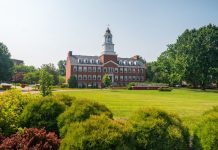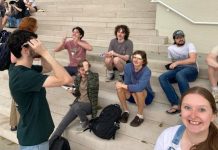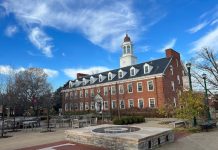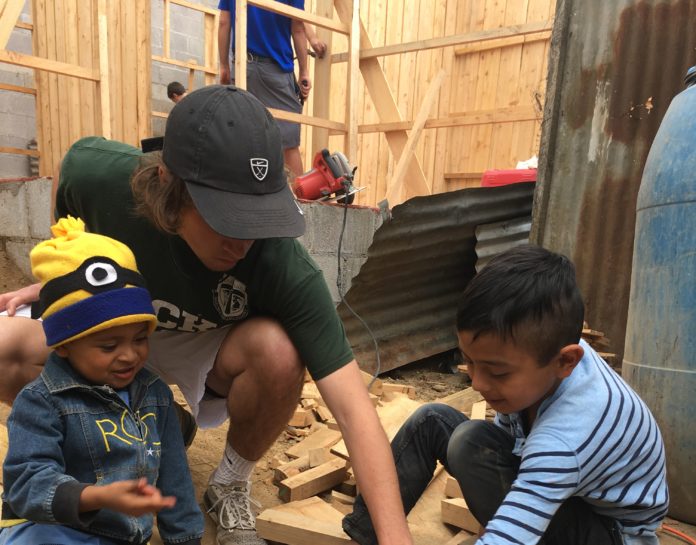
Through a liberal arts education, students are able to apply their education to real life environments through service learning. Last semester, two groups of students attended alternative winter break trips, sacrificing time out of their holiday to engage with impoverished populations and enhance their understanding of other cultures and people, achieved by both climbing active volcanoes and simply organizing closets.
Dr. LeVan, associate professor of Mathematics, has taken 6 student groups abroad over the past 5 years to serve in Guatemala City, the capital of Guatemala.
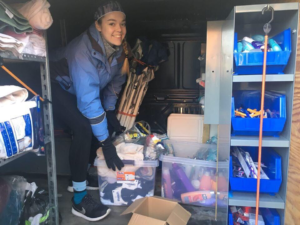
The group works alongside Catalyst Resources International (CRI), an organization that hosts groups and missionaries while staying in Guatemala.“We stay in a safe compound in Guatemala City that CRI owns. It provides us a warm place to stay with comfortable beds, hot showers, and the internet. There is a Florida phone line available, if needed. They also have a local team come in to make Guatemalan breakfast and dinner for us. The food is so good, I often come back a little heavier, even though we work hard all day long!” said LeVan.
CRI uses funds gathered by partnering groups to provide supplies for their projects. “The projects include building a house for a needy family, staining other homes, working at an orphanage (The House of Hope), and getting immersed in the culture of the village in which we work,” said LeVan.
The group built two houses for two different families over the break, providing a basic need to struggling families. “The family is chosen by CRI and a local pastor to choose a family that is especially in need. The house is a wooden structure on a 20×20 concrete pad. This might not seem much to people in the U.S., but it is a life changing event for the family,” said LeVan. “While the house is obviously an important project, we always make sure we take time to get to know the family. This leads to a lot of laughter, hugs, and play time with the kids of the family and community. We have gone back to previous sites, and the families remember us and will come up to say hello and give us a hug.”
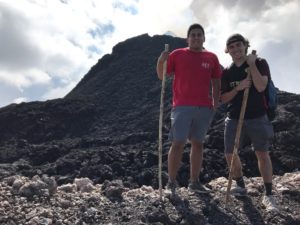
However, the group of students also indulged themselves as tourists in Guatemala. “While we work hard, we also take time to relax and have fun. We visit the city and markets of Antigua or hike a volcano. We sometimes visit a resort on the Pacific Ocean that has black beaches and gives us an opportunity to release baby turtles. We have also visited Lake Atitlan to go zip lining or take a boat ride around the lake. Guatemala is a beautiful country and we take time to recognize that fact,” said LeVan.
One student attendee, junior Thomas Shellenberg, gushed over Guatemala’s volcanoes. “We actually got to go to the volcano in Guatemala City called Pacaya, and a couple of us climbed all the way to the top, which was the first time anyone could do that for eight years. It erupted in 2010. It’s still an active volcano. A lot of us got to go up 100 yards away from the crater that was spitting out rock. You could ski down the volcanic ash and stuff,” said Shellenberg.
As a Spanish minor, Shellenberg practiced his Spanish speaking skills in an environment where he had to. “When you’re speaking to people, it’s almost exclusively because you need to. It was funny because a lot of my classmates who were working beside of me were trying to talk with the kids, but they didn’t know any Spanish. Talking to the kids was the easiest part for me,” said Shellenberg. “When we’re done with the house, we give the family the keys and talk to them and dedicate it to someone. I was able to say a few words on behalf of classmates and professors about what the trip meant to me, and it was very powerful for me and for others,” said Shellenberg.
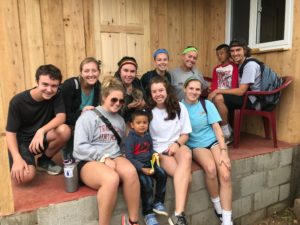
Dr. LeVan says that one purpose of a liberal arts education is to make students into better citizens and that service learning is an outlet for such enhancement. “Opportunities such as Alternative Winter and Spring Break trips allow students to give up time that is usually used on ourselves and to instead use it in service to others. This can lead to experiences of working in extreme poverty or damaged areas from natural disasters,” said LeVan.
“They allow us to see the world through a spectrum that is not our own. They allow us to see that it is not circumstances around us that can determine who we are but our response to those circumstances. To see the joy and happiness in a village that is overwhelmed by hunger and poverty is a perspective-changing event for our students,” said LeVan.
LeVan notes that service learning does not have to happen abroad to be meaningful. “Note that we don’t have to take these types of trips to experience this every day. There are multiple opportunities to reach out to those in need mere blocks from Transylvania. I am trying to incorporate service learning into more of my courses. Reading about and discussing these issues is fine, but actively experiencing them and working to help others is a big part in making us better citizens. Thus, a big part of a liberal arts education,” said LeVan.
Another group of students traveled to Wilmington, North Carolina on an alternative winter break trip. Under the arrangements made by Alexa Quiroz, Transy’s Community Engagement Support Specialist who also attended, the group partnered with Vigilant Hope. The North Carolina based organization engages in local outreach by educating the public on poverty, tutoring youth of all ages, and providing resources to the homeless, which was the main service for the Transy group.
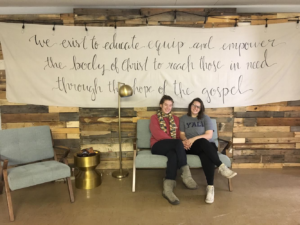
Due to the weather, students were not able to complete their planned outside activities and instead, among other indoor tasks, organized closets in the Vigilant Hope building. “The projects that we did didn’t seem to directly influence the homeless, but in reality they did because we were helping the organization get on their feet and organize so they can help the homeless,” said junior Jessi Samuel.
“We also went and worked in a food bank one morning. We helped them organize all their food and get ready for that morning when they have the homeless population come in and ‘shop’ for their food. They were able to come in and they had bags and shop for their food instead of going to the grocery store and spending money they don’t necessarily have,” said Samuel.
Students stayed in a church that gave free breakfast to the homeless, and they were able to interact with individuals through meals.“The homeless were able to come and have meals there. We ate breakfast with them a few times. I was able to interact with the homeless population. That’s not something I’ve done in Lexington: sit down and have a meal with them. I sat with these two older ladies and they were telling me all about their big New Year’s celebration they had and about these home remedies I could use in case I was sick. It was a lot easier to talk to them than expected,” said Samuel.
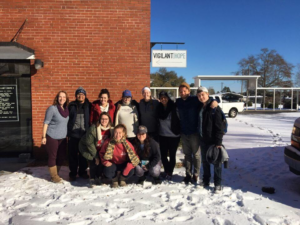
The group applied initiatives that Vigilant Hope used in Wilmington to Lexington by creating engagement packs. The packs are filled with basic necessities such as a toothbrush, toothpaste, and water. A slip of paper is also included with local resources for the homeless population. “When you see a panhandler on the street, and they are asking for money, there is that awkward conversation or awkward eye contact, and you’re fiddling with your phone or with the radio, and you really don’t know what to do. Instead of giving them money you can give them one of these. So you say “Oh, I don’t have money but take this,” in hopes that you actually have a conversation with them, just to reestablish that they have dignity. It reestablishes that they do matter,” said Alexa Quiroz.
Free engagement packs are available for students to hand out in Michelle Thompson’s office, in the Campus Center across from Conference Room A. If a student would like to make an engagement pack of their own, contact Alexa Quiroz to receive resources to fill in the bags. “It’s so important for students to get involved because they are such vital resources that can be used throughout the community,” said Quiroz.


